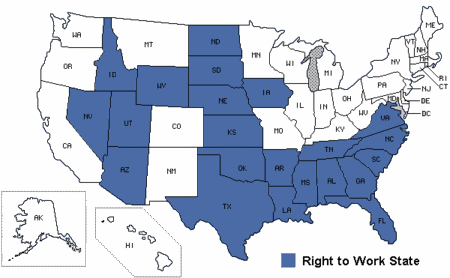As a follow-up to
my post below, regarding Bush’s executive order allowing federal contractors rebuilding in the aftermath of Hurricane Katrina to pay below the prevailing wage,
Pam makes a good clarification that I’d like to reiterate here:
Commenter Oddjob rightfully pointed out the "prevailing wage" point, which could, in union jobs mean much higher than the minimum wage. But all bets are off in Right to Work states, which mean traditional union employment (and wages) for the most part, doesn't exist:

As you can see, the right to work in the disaster region is the "right to work for less" and for contractors to make more buxxx. As the Teamster's site notes,
There is a misunderstanding that organizing is somehow different, or more difficult, in so-called right-to-work-for-less states. In fact, organizing law and procedure is the same in right-to-work and non-right-to-work states. The only differences are that workers in states that have passed these so-called right-to-work laws are paid considerably less on average, and the states are more likely to have unfavorable political conditions.
In addition to Thatcher-esquely cracking any unions that may exist, the main MO here seems to be granting greater profit-making potential to the contractors without the government having to spend any more money. If Halliburton contracted to the government for $1 million, their profit margin was limited to whatever they could make above time and materials, both of which were fixed prices. But with the executive order in place, they can pay lower wages (time), thereby increasing their opportunity for profit, and the government doesn’t have to chip in an extra dime. See how that works?





Shakesville is run as a safe space. First-time commenters: Please read Shakesville's Commenting Policy and Feminism 101 Section before commenting. We also do lots of in-thread moderation, so we ask that everyone read the entirety of any thread before commenting, to ensure compliance with any in-thread moderation. Thank you.
blog comments powered by Disqus